Letter from Birmingham Jail Analysis Questions - Rebekah-Arey
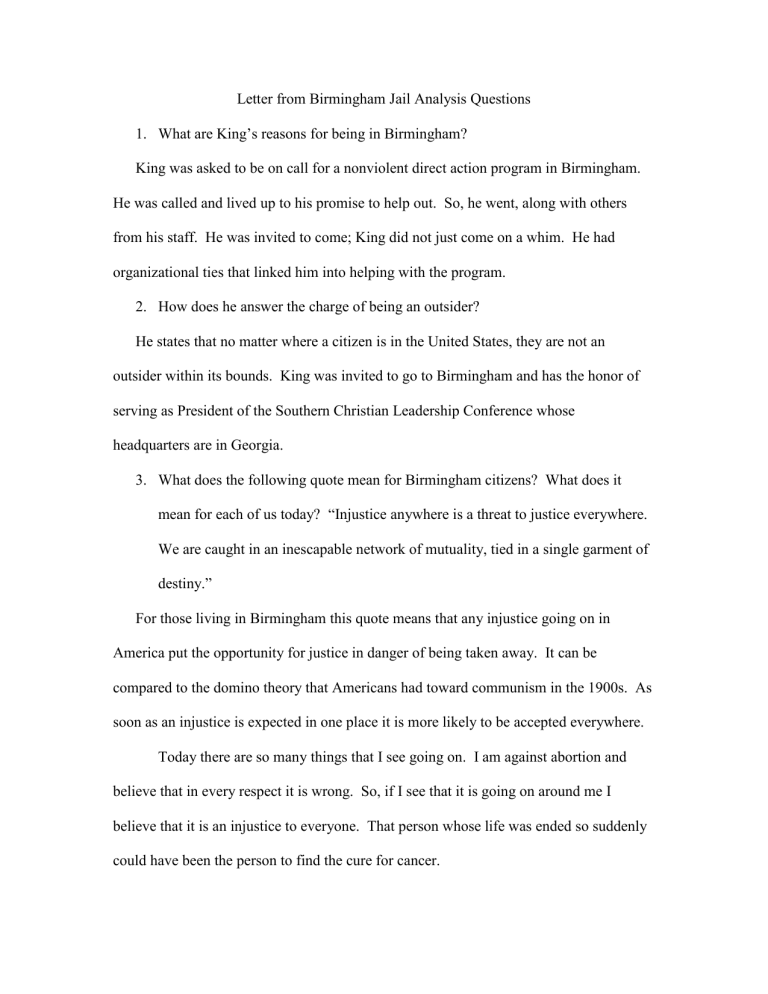
Letter from Birmingham Jail Analysis Questions
1.
What are King’s reasons for being in Birmingham?
King was asked to be on call for a nonviolent direct action program in Birmingham.
He was called and lived up to his promise to help out. So, he went, along with others from his staff. He was invited to come; King did not just come on a whim. He had organizational ties that linked him into helping with the program.
2.
How does he answer the charge of being an outsider?
He states that no matter where a citizen is in the United States, they are not an outsider within its bounds. King was invited to go to Birmingham and has the honor of serving as President of the Southern Christian Leadership Conference whose headquarters are in Georgia.
3.
What does the following quote mean for Birmingham citizens? What does it mean for each of us today? “Injustice anywhere is a threat to justice everywhere.
We are caught in an inescapable network of mutuality, tied in a single garment of destiny.”
For those living in Birmingham this quote means that any injustice going on in
America put the opportunity for justice in danger of being taken away. It can be compared to the domino theory that Americans had toward communism in the 1900s. As soon as an injustice is expected in one place it is more likely to be accepted everywhere.
Today there are so many things that I see going on. I am against abortion and believe that in every respect it is wrong. So, if I see that it is going on around me I believe that it is an injustice to everyone. That person whose life was ended so suddenly could have been the person to find the cure for cancer.
4.
What are the four basic steps of nonviolent direct action?
The four basic steps of nonviolent direct action are: collection of the facts to determine whether injustices exist, negotiation, self purification, and direct action.
5.
Why did King and others decide to delay their actions?’
They believed that they needed to undergo a process of self-purification and selfanalysis before they could go to the community.
6.
What does King mean by “constructive nonviolent tension” and how does he define its goal?
King does not want opposed violent tension among the people. He defines its goal as a necessity for growth. This helps people to really think about what they are doing and allow for them to break free of the bondage that has held them for so long.
7.
Choose an example from U.S. History which represents the “painful experience that freedom is voluntarily given by the oppressor.”
I do not think that at any time there has been freedom gained without opposition from the oppressor. The oppressor is going to want to do just that until he/she has been overthrown.
8.
Choose another example from history which illustrates his point that”justice too long delayed is justice denied.”
When the Jews were denied their freedoms because of their race the justice they deserved was delayed. Regardless of when the freedom is given back, at some point it was taken away and the people were denied justice.
9.
Choose from King’s list of injustices and compare three of them to the Bill of
Rights or the Universal Declaration of Human Rights.
King was arrested for the charge of parading without a permit. In theory this would be a good idea but it only allows segregation to continue. This denies King his first amendment rights of peaceful assembly and protest.
King and the black community are forever fighting the “degenerating sense of nobodiness”. It is as though they have no human rights because they are not human. It is our human right to be treated as such.
Most African Americans do not even get enough respect as to be called by their own name. Most whites called them nigger or boy. When we are born, we are given a name that we go by for the rest of our life. There is no reason for someone to disrespect another person by not calling them by their given name.
10.
How does King define the two types of law; just and unjust?
Just laws concur with the moral law, or the law of God. It uplifts the idea of human personality and does not segregate based on race, ethnicity, or gender. An unjust law goes against the moral code. It demoralizes humankind and degrades human personality.
11.
Give an example of present day law you might feel a moral obligation to disobey.
The only time that I might feel a moral obligation to disobey would be when the law goes against my morals/values. In most cases I am too afraid to break the rules for any reason but if something went way against what I believe I would have to stand up for what I believe in. One thing that comes to mind is that prayer is not allowed in schools. I am aware that teachers are not allowed to promote any faith in the classroom and can not lead any type of Bible study. There is no time for students to pray during school but I find time to get by myself and spend time with my Lord.
The only other time I can think of that I might disobey the law would be if my safety was endangered. If I had someone threatening my life or the life of one of my family members I would do what is necessary to make them safe or get myself to safety.
If I had someone on campus that was threatening me, I would not be afraid to bring a pocket knife or something of that sort with me even though it is against the law. I would morally feel the need to keep myself and especially my family safe.
12.
Must we obey laws we do not participate in creating? Why or why not?
Even though we do not participate in the laws that have been created it is our civil responsibility to vote. We voted for the leaders who are in charge and they are the ones who are making the laws. If you did not vote you have no right to say anything bad about what that particular person is doing. In addition to that, whether we like the law or not, we are still held accountable for following it. If I just decided that it is stupid to have to wear my seatbelt while driving and I got pulled over for it, I would still have to pay the consequences for choosing not to obey the law.
13.
Why does King think breaking an unjust law “lovingly” would be an expression of respect for the law?
When one lovingly breaks the law they are willing to accept the consequences for their actions. When one’s conscience tells them that a law is unjust and they break it they are willing to pay the penalty in order to get the law changed.
14.
What does King warn will happen if the Negro community is not allowed to demonstrate through nonviolent actions? Is this a threat?
If the Negro communities are not allowed to protest in this way it is likely to become violent. This was not meant as a threat; just a statement of what he fears may come in the future if things are not handled now.
15.
Why does King welcome the label extremist?
He has gained satisfaction from the title. There have been many people in the world that have been labeled extremist that have made a huge impact. For example: Jesus was an extremist for love, Amos was an extremist for justice, and Paul was an extremist for the
Christian gospel, etc.
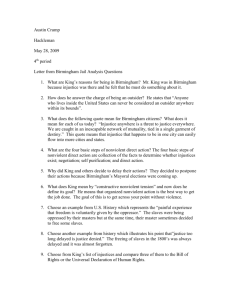
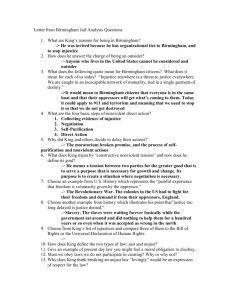
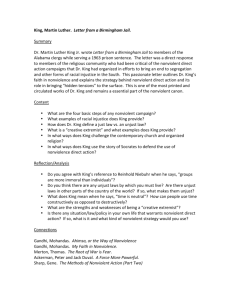
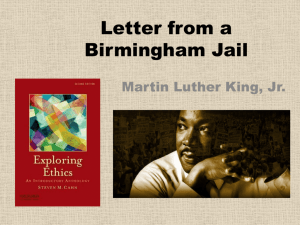
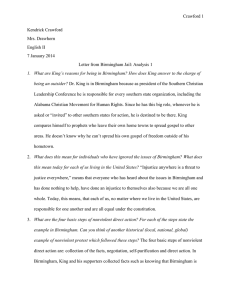
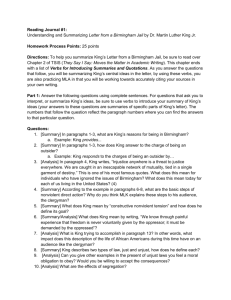
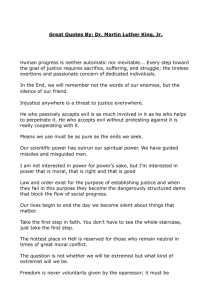
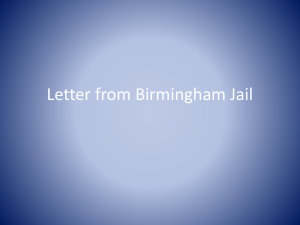
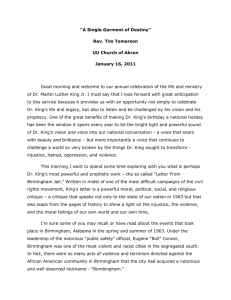
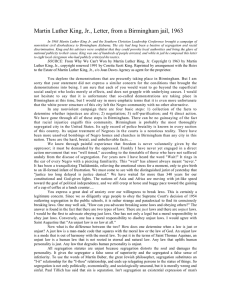
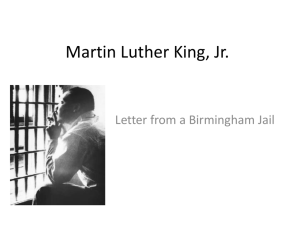
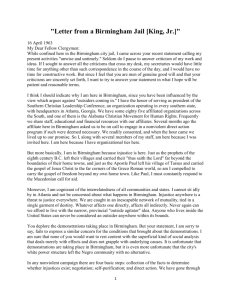
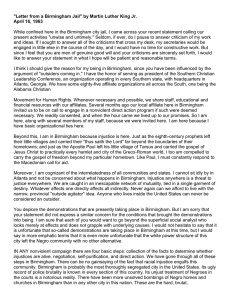
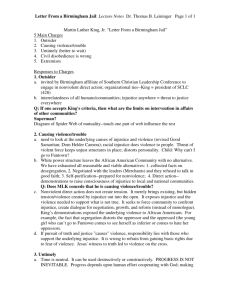
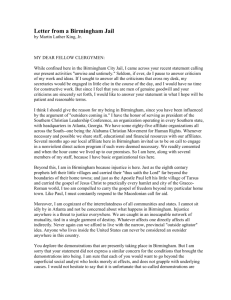
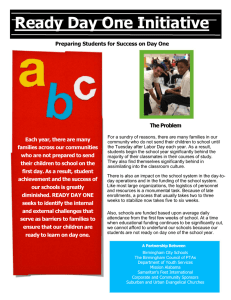
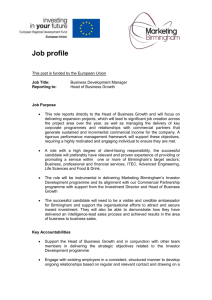
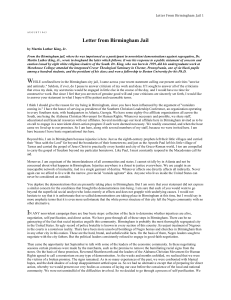
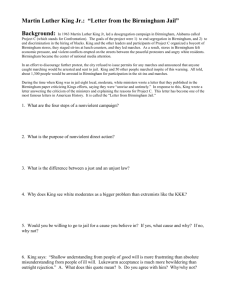
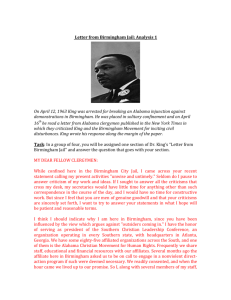
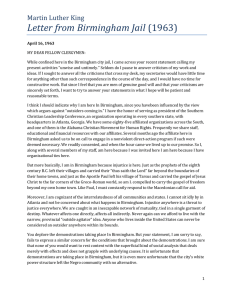
![Project description [Word]](http://s3.studylib.net/store/data/008043425_1-3e4ed50c123e3e03f00b9fc84ce61bee-300x300.png)